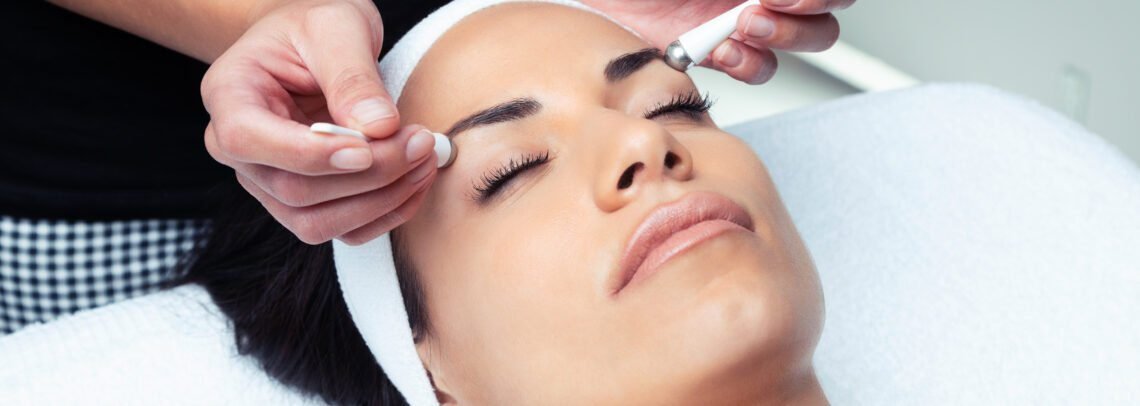
Chemical peels are also known as chemexfoliation or dermapeeling. Chemical peels remove layers of skin, revealing more youthful skin. It helps to diminish fine lines, wrinkles, and acne scars.
A chemical peel causes harm to the skin. After peeling it off, fresh and more youthful skin emerges. The regenerated skin is often smoother, with fewer creases and wrinkles, more equal color, and a brighter complexion.
Deep Chemical Peel Benefits for Long-Lasting Effects: Deep chemical peels target severe wrinkles, deep scars, and significant sun damage.
They penetrate multiple layers of skin, providing dramatic results for long-term skin rejuvenation.
Ideal for individuals seeking intensive, transformative outcomes, this peel is a go-to for lasting improvements.
Glycolic Acid Peel for Glowing Skin and Gentle Exfoliation: Glycolic acid peels are known for their ability to gently exfoliate the skin and boost radiance.
They are perfect for individuals looking for the best chemical peel for glowing skin while improving texture and tone.
This peel effectively brightens dull skin and reduces minor imperfections.
TCA Peel for Acne Scars and Stubborn Pigmentation: A TCA peel for acne scars targets deeper imperfections like stubborn pigmentation and moderate acne scars.
This treatment promotes even skin tone and enhances overall clarity, making it a popular choice for addressing discoloration and blemishes.
Salicylic Acid Peel for Oily Skin and Acne Control: Designed for oily and acne-prone skin, a salicylic acid peel for oily skin unclogs pores, reduces breakouts, and balances oil production.
It is highly effective in addressing blackheads, whiteheads, and inflammation caused by acne.
Lactic Acid Peel for Sensitive Skin: A lactic acid peel for sensitive skin is a milder option that exfoliates without causing irritation.
This peel is ideal for individuals with delicate skin, delivering hydration while brightening and smoothing the complexion.
Chemical peels are the most effective in removing dead skin cells. After it is peeled off it reveals smoother and more gentle skin. It also reduces fine lines, wrinkles, acne scars, and other signs of aging.
When a chemical peel is removed, it reveals the layer of brighter skin. Chemical peels work by targeting dull and uneven skin tone. It enhances brightness and restores a youthful glow.
A chemical peel can help reduce and remove acne scars. Chemical peels enhance collagen production and promote the growth of new cells. Therefore, it helps in removing marks and scars.
Chemical peels have antiaging properties. Since peels improve skin’s elasticity, it removes and reduces signs of aging such as wrinkles and lines. It also adds smoothness to the skin and makes your skin even.
Chemical peels work by removing layers of skin and promoting even tone. Chemical peels can be used as a part of hyperpigmentation treatment as they address concerns like melasma, dark spots, and discoloration.
Chemical peels tighten the skin. This is because it boosts collagen levels. Chemical peels tighten the skin. These peels make your skin firm. These skin rejuvenation peels provide a non-invasive solution for sagging skin.
Chemical peels are most commonly performed on your face, neck, or hands. They can help reduce or improve:
Who isn’t a Perfect Candidate for Chemical Peels?
Avoid using chemical peels if you:
Chemical peels are generally safe for use. However, there are certain common side effects, including:
The recovery process involves using ointment. You’ll also need to wear sunscreen to protect your skin from the sun.
The recovery process depends on the types of peel.
Read More:
Understanding Sculptra Treatment: What is it, Benefits, & Side Effects
Everything you Need to know about Botox Treatment
The Final Word
Chemical peels provide a range of benefits for skin rejuvenation, from reducing fine lines and wrinkles to improving acne scars and hyperpigmentation.
The various forms of peeling can address a variety of skin issues. It enables people to select the most appropriate alternative for their requirements. While glycolic and lactic acid peels are gentler on sensitive skin and provide moderate exfoliation, TCA and salicylic acid peels address more intractable concerns such as acne scars and greasy skin. Deep peels provide significant, long-term benefits for serious skin damage.
However, it’s crucial to understand the potential side effects of using chemical peels. Moreover, different types of peel have different recovery processes. Individuals with certain skin conditions, darker skin tones, or other health concerns should avoid chemical peels or consult with a dermatologist.
Ultimately, consulting with a qualified professional is essential to determine the best chemical peel approach and ensure safe and effective treatment for achieving desired skin. In that case, you can visit a medical spa where the Chemical peels treatment is provided using proper techniques.
Chemical peels are safe; however, there may be some side effects.
No, using chemical peels is not painful.
Results may not be permanent.
Chemical peels are effective in reducing signs of aging.
© Copyrights 2026 Pure Perfection MedSpa. All rights reserved.
Powered by DevZeo